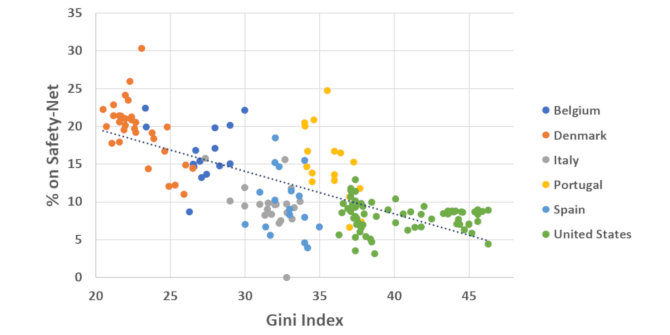There is a wealth of academic research published on the European Union, but do EU policymakers actually make use of this research in their work? Drawing on a new study, Francesco Duina finds evidence that staff at the European Commission regularly draw on the work of academics.
The last in-person conference for ‘Europeanists’ organised by the Council for European Studies was in Madrid in June 2019. Attendees from around the world could choose from three days of wonderful panels and presentations. The printed programme was 150 pages long. Seasoned scholars mingled with graduate students and professors in the early stages of their careers. Many papers focused on the EU.
It was exciting and normal at the same time: the field of EU studies has grown immensely over the last 25-30 years, and the conference was just another manifestation of this. Today, several major journals, numerous centres of excellence across the world, book series, and entire careers are dedicated to the study of the EU. The EU itself has supported this in multiple ways.
It was at this conference when listening to a stimulating presentation (made to a handful of academics scattered in a classroom) on what the EU Commission and European Central Bank ‘should do’ to fix the imbalances caused by the euro that an unsettling question presented itself to me: Do EU officials pay any attention to us? Does our work matter to them at all? We seem to be so knowledgeable and even wise. But we do talk a lot to each other. Do EU officials consider what we produce? What began as a fleeting thought became a pressing, even existential, matter. What if most of our professional lives amount to just a conversation amongst ourselves?
EU scholars have recently engaged in valuable introspective analyses of their field. This has meant exploring the extent to which EU scholarship takes seriously questions of gender, race, geographies, and power. My question draws from the same spirit of reflection. It is time to assess that scholarship by, in this case, stepping outside of it and wondering if it makes any difference to policymakers.
Spotlight on the European Commission
As it often turns out, other minds have been entertaining similar thoughts. In April 2020, the editors of the Journal of European Public Policy, Jeremy Richardson and Berthold Rittberger, launched a new section of their journal: the Policy Impact Forum. The Forum aims precisely at assessing the relevance of EU scholarship for the work of EU policymakers. Stressing the ‘potential’ of much of the research published in the journal to impact public policy, the editors called for contributions on the matter.
In a new article in the Forum, I report on the findings from an investigation I conducted in autumn 2020 and the first half of 2021 of European Commission officials and their use of academic research on the EU. I defined academic research on the EU as the body of social scientific and legal knowledge on the EU (inclusive of its member states as constituent parts) that is produced independently of requests by EU officials or permanent input channels. The key concern, in other words, was whether scholarship on the EU – as produced for academic purposes and found in academic outlets such as journals, books, and conference proceedings – finds its way into the EU policymaking process.
I circulated an online survey in the Commission and 57 officials of mixed ranks from 15 Directorates-General (DGs) completed it. I also conducted 45 in-depth interviews (via Zoom) with mostly mid-level officials from 22 DGs and the Secretariat General. The findings, much to my relief, were overall remarkably encouraging.
To start, the EU officials showed much interest in the topic. My unexpected survey and interview requests reached them during the Covid-19 pandemic. I feared most would ignore me. The opposite proved true. The survey yielded a robust set of data. Almost half of the officials contacted for interviews, in turn, agreed to meet. The interviews themselves lasted on average over 45 minutes.
Here are the highlights. Turning to the survey, nearly 75% of respondents reported using academic research on the EU in their work. Almost 40% of those indicated doing so ‘often’ and over 35% ‘sometimes’. Importantly, 56% of them also found this research ‘very valuable’. Another 35% saw it as ‘somewhat valuable’. When asked about their DG colleagues’ use of academic research on the EU, their estimates were lower (unsurprisingly, if we assume some positive self-selection among the respondents) but still impressive. The same applied to colleagues in other Commission DGs. Briefly put, academic research on the EU does matter!
The survey asked about what officials take away from academic research on the EU, primary venues of access, and its applications. The picture that emerged is of a pragmatic, data-driven use of directly-accessed social-scientific academic research on the EU aimed at the production of policies or improving credibility.
For instance, 80% of users of academic research on the EU indicated data as a takeaway; solutions to problems (52%), methodological approaches (50%), and the definition of problems (35%) followed. Some 71% of users access research directly from journals. Indirect venues such as policy tanks and pressure groups (56%), the news or other outlets (55%), DG JRC (53%), and academic conferences (45%) followed. Some 66% reported using social scientific academic research on the EU; 37% legal academic research on the EU; and 20% other (i.e., biological, environmental).
The two most common applications were the generation and recommendation of policies (71% of users indicated this) and bolstering work/output credibility (66%). The more abstract purposes of identification or definition of problems (56%) and methods development (41%) followed.
The value of academic research
The interviews afforded valuable opportunities to delve deeper into the minds of mostly mid-level managers (Heads of Unit, etc.), along with a few senior (Directors, Deputy Director Generals, etc.) and more junior officials. By and large, these officials confirmed the level of engagement with academic research on the EU expressed by the survey respondents. They then added important nuances and clarifications.
Many stressed that academic research on the EU is especially helpful in the legislative proposal development phase. Those proposals must pass the Commission’s Regulatory Scrutiny Board and other requirements of the Better Regulation agenda launched in the early 2000s. But academic research on the EU is also instrumental in soft-law and applied policy activities. These range from regional funding to Erasmus student exchanges, trade negotiations, democracy promotion, and the Open Method of Coordination. Finally, officials involved in legal compliance and enforcement reported finding academic research on the EU helpful – especially to gain an understanding of member states’ legal systems and court cases.
Importantly, the interviewees elaborated on why this research is in fact valuable in those various contexts. Three reasons stood out. First, academic research on the EU offers high-quality material that is objective and accurate – in contrast, some noted, to what lobbying groups or policy tanks might promote. Secondly, this research can boost output credibility for reasons of perceptions rather than factual validity. Academic references make a policy proposal ‘look’ more serious. Third, academic research on the EU can help officials justify their actions publicly – an increasingly pressing concern as citizens, nationalist parties, and others scrutinise and criticise the EU’s reach and output.
Throughout, the interviewees emphasised that the specific uses of academic research on the EU vary depending on roles, personal inclinations, and hierarchy. On the latter, my initial assumption that senior officials would be less inclined to use academic research was proven wrong. Those officials certainly leverage it, though in their cases often in distilled form as summarised and screened by their staff. Several also pointed out the close connections their staff and units have with academia – by way of conferences, networks, academic exchanges, and even contributions to publications (and in more than one case actually hosting an academically-oriented journal or other publications).
Not everyone shared these views, of course. A minority of survey respondents reported not using academic research on the EU. Several also thought their Commission colleagues make little use of such research. Some of the interviewees concurred. They expressed scepticism about the ability of academic research on the EU to grasp the real word, its abstractness, and the fact that it often seems dated. Others complained that they found it difficult to access it. Time is always tight, necessities change, access can be expensive, and it is difficult to find what could be helpful in the moment.
The interviewees shed light as well on the institutional features of the Commission. Is there something about it that makes it especially open to academic research on the EU? Officials identified several ‘positive’ institutional features conducive to the use of this research. These included a high degree of technocratic freedom, a culture of evidence-based expectations, and a multinational staff that puts a premium on ideas. The ‘constraining’ features included scarce resources and the principle of subsidiarity.
In closing, several interviewees expressed their strong interest in more effective and structured ways of accessing academic research on the EU. On the one hand, they lamented the difficulties they have in finding and communicating with academics, and securing systematic exposure to their output. On the other hand, they noted that academics themselves seem uninterested in the practical impact of their work. There appears to be a ‘mismatch’ between academic research on the EU and their needs. The challenge is obviously significant, and it was beyond the scope of this paper to suggest possible solutions. What became clear, however, is that opportunities abound for more interactions and growth.
For more information, see the author’s accompanying paper in the Journal of European Public Policy
Note: This article gives the views of the author, not the position of EUROPP – European Politics and Policy or the London School of Economics. Featured image credit: European Council





